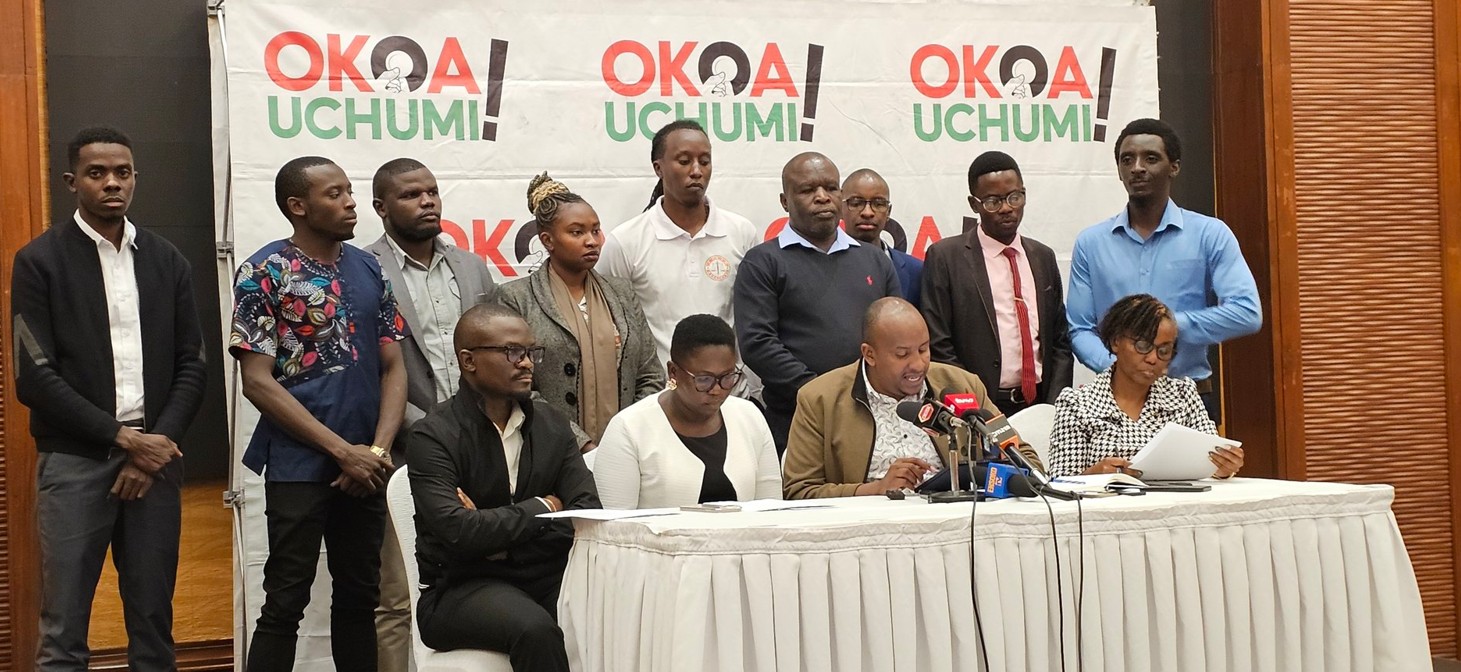Okoa Uchumi warns 2025 budget will hurt poor and widen inequality

The group criticised the government’s focus on increasing tax revenue without addressing wastage, duplication, and misplaced spending priorities.
Lobby group Okoa Uchumi has warned that Kenya’s proposed 2025/26 budget will raise the cost of living and deepen inequality, saying it protects powerful interests while burdening millions of ordinary citizens.
The group criticised the government’s focus on increasing tax revenue without addressing wastage, duplication, and misplaced spending priorities.
It said key proposals in the Finance Bill 2025 would affect basic needs such as food, healthcare, and education, especially for low-income households.
"The measures implemented may not achieve the desired economic stability without addressing the underlying inefficiencies in expenditure," the group said.
The proposed budget sets total spending at Sh4.24 trillion against projected revenue of Sh3.32 trillion, leaving a Sh876.1 billion deficit that will be largely financed through domestic borrowing. Public debt has already crossed Sh11.35 trillion.
One of the most disputed proposals is the increase of the tax-exempt per diem allowance from Sh2,000 to Sh10,000, which Okoa Uchumi said would mainly benefit senior public officials at the expense of ordinary Kenyans.
"Workers in the informal sector, self-employed individuals, and low-income earners continue to face the brunt of taxation with minimal relief," the group said.
Okoa Uchumi also opposed the planned removal of Section 59A(1B) of the Tax Procedures Act, which currently protects citizens’ privacy by requiring the Kenya Revenue Authority to obtain a court order before accessing personal data.
"If passed, this amendment would grant KRA unchecked surveillance powers… violating the constitutional right to privacy under Article 31," the group warned, linking it to fears sparked by last year’s protests that were marked by state surveillance and crackdowns.
The lobby raised alarm over proposed tax incentives for Special Economic Zones and the Nairobi International Financial Centre, saying they risk becoming tax shelters for politically connected individuals without proper transparency.
"These proposals represent a dangerous shift in fiscal fairness," they said.
The group criticised the move to shift essential goods—such as solar panels, animal feed inputs, electric vehicles, and raw materials for medicine—from zero-rated to VAT-exempt status.
Okoa Uchumi said this would raise production costs and consumer prices.
"Placing the greatest burden on low-income households," they said.
The watchdog also raised concern about changes to the VAT Act, including the removal of Section 17(5)(c), which allows businesses to offset excess input VAT against other taxes.
It said this would make life harder for small businesses already struggling with delayed VAT refunds.
On budget priorities, Okoa Uchumi questioned the government’s focus on the Public Administration and International Relations sector, which gets 11% of the total budget, compared to just six per cent for health and three per cent for social protection.
The group flagged a Sh4.3 billion cut to free primary education, including Sh600 million taken from the school feeding programme, even as the number of targeted learners grows from 2.6 million to 2.8 million.
"Sh600 million could provide one meal a day for 50,000 children for the entire year," the group said.
The fertiliser subsidy has also been reduced from Sh14 billion to Sh8 billion, despite the number of farmers targeted being set to double.
At the same time, the government has introduced seven new state departments, including one for Justice and Human Rights, many of which were previously housed within existing ministries.
"Are we cutting vital support to farmers just to finance more bureaucracy?" the group asked.
While the group welcomed an extra Sh6 billion for primary healthcare and Sh5 billion for emergency and chronic illness care, it criticised the failure to allocate any money to the Linda Mama maternity programme.
It also pointed out that funding for the national AIDS control programme remains unchanged, despite a Sh9.4 billion shortfall following a stop-work order by the US government.
Okoa Uchumi condemned the rise in spending on police and security agencies, warning of a shift toward repression.
"The state is galvanising security forces that will unleash brutality," they warned, citing past threats and raids against activists.
They also raised concern over how funds are moved through supplementary budgets, often reducing social spending in favour of the Executive.
In the 2024/25 financial year, funding for the Executive Office of the President increased by 17.6%, while allocations for safety nets were reduced.
Okoa Uchumi called on Parliament to reject the regressive proposals and shift focus toward sectors that serve the public.
"Kenya cannot tax its way out of this crisis. Austerity for the poor and indulgence for the powerful is neither a viable path nor a sustainable alternative," the group said.
